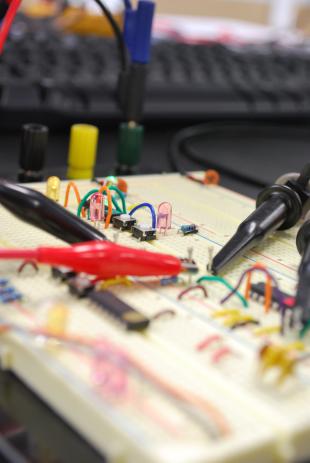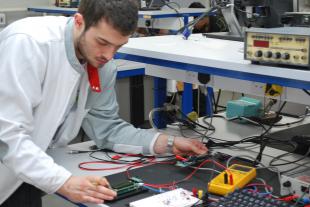Many of our staff work with international companies from all over the world. With such strong links to world leaders in the latest technology, and with research staff who are active in developing advances, we are very well placed to teach students what is important for their future careers.
We regularly use leading edge technology examples in lectures, and students experience this first hand in their individual final year BEng or MEng project carried out in cooperation with a member of academic staff. For MEng students, this is a 9-month project placement, usually carried out in industry.
All of our undergraduate degrees are accredited by the Institution of Engineering and Technology (IET). This helps to improve graduate employability by ensuring that students have developed the appropriate skills and knowledge for an engineering career and for professional registration (Chartered Engineer)
Electronics and Electrical Engineering at Edinburgh has a long track record of Spin-out Companies and innovations, including key players such as Wolfson Microelectronics (now Cirrus Logic), who produce audio chips for the latest Apple products, or VLSI vision (now STMicroelectronics), who produce imaging sensors and processors for automotive, security, gaming and medical applications. MicroEmissive Displays pioneered a near-to-the-eye P-OLED microdisplay for uses in video camera viewfinders and 3-D optical eyewear.
Student Profile
Emily Wang 5th year MEng (Hons) Electronics & Electrical Engineering
The University’s close connection with industry was an important factor for me. I want to gain experience in various firms during my studies and I believe the University’s close links with industry will help me gain the experience I would like.
Careers in Electronics and Electrical Engineering
A degree in an electronics and electrical engineering subject gives a graduate a very wide choice of careers - for example, the requirement for engineers in the communications and power generation industries is far from being met at present, and these shortages are certain to continue for some time. While one of the first job destinations for our graduates is the electronics design industry, where the UK is a world leader, many other employment opportunities exist in such areas as broadcasting, energy, telecommunications, government research establishments and academic institutions.
The extension of information technology into all forms of business, commerce and health care opens up further opportunities for those who, at any point in their career, decide to take up employment in these new areas. Some of our graduates have found employment in the financial sector and find the training they have been given at Edinburgh invaluable.
Some of the companies our recent graduates have gone on to work in include: Bloomberg, Cirrus Logic, Dialog Semiconductor, EDF Energy, Leonardo, Mathworks, and ST Microelectronics among many others.




